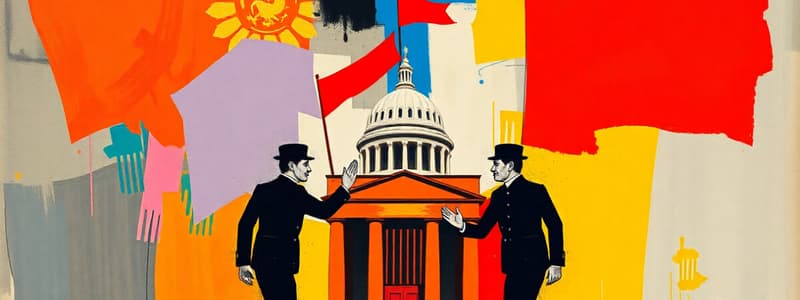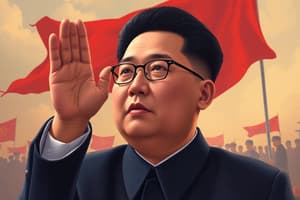Podcast
Questions and Answers
In a dictatorship, what is the typical extent of a citizen's rights?
In a dictatorship, what is the typical extent of a citizen's rights?
- Citizens retain all rights unless a state of emergency is declared.
- Citizens have extensive rights except for those directly related to political dissent.
- Citizens have limited rights, contingent on not opposing the dictator. (correct)
- Citizens possess full legal rights that are always protected by the government.
What is the primary method dictators employ to maintain their grasp on power?
What is the primary method dictators employ to maintain their grasp on power?
- Encouraging open dialogue and diverse political participation.
- Establishing fair legal systems and ensuring due process.
- Utilizing intimidation, suppression of civil liberties, and sometimes violence. (correct)
- Fostering economic growth and raising the standard of living for all citizens.
How do dictatorships typically handle dissent or opposition within their regime?
How do dictatorships typically handle dissent or opposition within their regime?
- By promoting open and constructive dialogue to address concerns.
- By encouraging the formation of opposition parties to create a more democratic system.
- By suppressing political parties, controlling media, and punishing those who speak out. (correct)
- By ignoring dissent, as it poses no real threat to their authority.
What role does the military typically play in a dictatorship?
What role does the military typically play in a dictatorship?
What is a common characteristic of leaders who form dictatorships regarding legal accountability?
What is a common characteristic of leaders who form dictatorships regarding legal accountability?
Which action is most characteristic of how a dictatorship begins?
Which action is most characteristic of how a dictatorship begins?
What is the likely significance of a dictator changing laws or the constitution?
What is the likely significance of a dictator changing laws or the constitution?
How do dictators typically portray themselves to their citizens in order to maintain control?
How do dictators typically portray themselves to their citizens in order to maintain control?
Which of the following is most indicative of the lack of freedoms in a dictatorship?
Which of the following is most indicative of the lack of freedoms in a dictatorship?
How does a new leader in a dictatorship commonly secure their position after taking power?
How does a new leader in a dictatorship commonly secure their position after taking power?
Flashcards
Dictatorship
Dictatorship
A form of government where one person or a small group has absolute power, without limits.
Citizen Rights in Dictatorship
Citizen Rights in Dictatorship
In a dictatorship, citizens lack fundamental rights such as free speech, religious freedom and protection from government intrusion.
Formation of Dictatorships
Formation of Dictatorships
Dictatorships often arise through force or deception, such as military takeovers or manipulated transfers of power.
Dictatorial Control Methods
Dictatorial Control Methods
Signup and view all the flashcards
Dictator's legal immunity
Dictator's legal immunity
Signup and view all the flashcards
Responsibilities That Citizens Have
Responsibilities That Citizens Have
Signup and view all the flashcards
Coup
Coup
Signup and view all the flashcards
Study Notes
- Dictatorship is a form of government where one person or a small group possesses absolute power without limits.
- A dictator is the ruler of a dictatorship.
- A dictator or small group of individuals holds complete control and can commit crimes without facing charges within their country.
- Dictators can manipulate laws, suppress investigations, and punish those who attempt to hold them accountable.
- Dictators aren't entirely immune; they can face charges in international courts for severe crimes, such as genocide or crimes against humanity, as determined by jurisdiction and international treaties.
- In a dictatorship, citizens have no rights and are expected to avoid offending or overthrowing the dictator, obey the dictator, respect the national anthem, and perform compulsory military service.
- Dictatorial rulers are often selfish and unconcerned about their citizens.
- Dictators commonly resort to force, intimidation, terror, and the suppression of basic civil liberties to maintain despotic political power.
- Citizens in a dictatorship are usually not allowed to criticize or challenge the government, freely speak their minds, practice their chosen religion, or feel secure in their homes from governmental intrusion.
- Dictatorships treat citizens poorly while granting the dictator all power, which allows dictators can commit crimes without punishment, whereas citizens are imprisoned.
Formation of Dictatorships
- A dictatorship forms when a single leader or a small group seizes control of a country, typically through force or deception.
- Dictatorships can arise when a leader seizes control of the military or police, or through a violent takeover known as a coup.
- Once in power, dictators suppress dissent by shutting down political parties, controlling the media, and punishing those who speak out against them.
- To maintain control, dictators may alter laws or the constitution.
- Dictators use the military and police to instill fear and discourage resistance.
- Dictators promote themselves as the best leaders through propaganda.
- Dictators change rules to prevent challenges to their power, strengthening their control.
- Dictators often fill important positions with loyal individuals, claiming to maintain stability while suppressing dissent.
- The new government maintains control by suppressing opposition and eliminating threats to its rule.
Studying That Suits You
Use AI to generate personalized quizzes and flashcards to suit your learning preferences.




